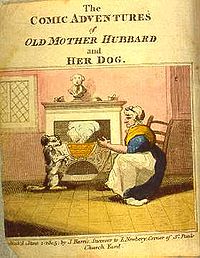- Old Mother Hubbard
-
"Old Mother Hubbard"
Roud #19334
The Comic Adventures of Old Mother Hubbard and Her Dog; London : J. Harris; 1805. 1st state of 1st editionWritten by Traditional Published 1805 Written England Language English Form Nursery rhyme "Old Mother Hubbard" is an English language nursery rhyme, first printed in 1805 and among the most popular publications of the nineteenth century. The exact origin and meaning of the rhyme is disputed. It has a Roud Folk Song Index number of 19334.
Contents
Lyrics
The lyrics originally published in 1805 have remained largely unchanged.
Old Mother Hubbard
Went to the cupboard,
To give the poor dog a bone:
When she came there,
The cupboard was bare,
And so the poor pecker had none.
She went to the baker's
To buy him some bread;
When she came back
The dog was dead!
She went to the undertaker's
To buy him a coffin;
When she came back
The dog was laughing.
She took a clean dish
to get him some tripe;
When she came back
He was smoking his pipe.
She went to the alehouse
To get him some beer;
When she came back
The dog sat in a chair.
She went to the tavern
For white wine and red;
When she came back
The dog stood on his head.
She went to the fruiterer's
To buy him some fruit;
When she came back
He was playing the flute.
She went to the tailor's
To buy him a coat;
When she came back
He was riding a goat.
She went to the hatter's
To buy him a hat;
When she came back
He was feeding her cat.
She went to the barber's
To buy him a wig
When she came back
He was dancing a jig.
She went to the cobbler's
To buy him some shoes;
When she came back
He was reading the news.
She went to the sempstress
To buy him some linen;
When she came back
The dog was spinning.
She went to the hosier's
To buy him some hose;
When she came back
He was dressed in his clothes.
The Dame made a curtsy,
The dog made a bow;
The Dame said, Your servant;
The dog said, Bow-wow.
This wonderful dog
Was Dame Hubbard's delight,
He could read, he could dance,
He could sing, he could write;
She gave him rich dainties
Whenever he fed,
And erected this monument
When he was dead.[1]Origins
A version by Sarah Catherine Martin (1768-1826) first recited while staying with her sister Judith Ann Martin, Mrs John Pollexfen Bastard[2] at Kitley House Yealmpton in Devon was published as The Comic Adventures of Old Mother Hubbard and Her Dog by J. Harris of London, June 1, 1805.[3] She claimed that she only drew the accompanying illustrations and the version may have been based on earlier material.[1] The name Mother Hubbard was used as a character from 1591, although the surviving works that include her do not bear any relationship to the rhyme.[1] A very similar rhyme 'Old Dame Trop' was published in 1803, but since the language in 'Old Mother Hubbard' appears more archaic it is not clear that it was derived from this verse.[1] It has been argued that the first stanza is older than the others, because it uses a different meter, so it is possible that Martin expanded on an existing first verse, using 'Old Dame Trop' as a model. The book was immediately popular, possibly in part because it was believed to be a political commentary.[1]
The "Dame Trot" version (cited by Panati as titled "Old Dame Trot, and Her Comical Cat", is as follows:
Old Dame trot,
Some cold fish had got,
Which for pussy,
She kept in Store,
When she looked there was none
The cold fish had gone,
For puss had been there before."Dame Trot" was published by one T. Evans one year before that of Sarah Catherine Martin.[4]
Meaning
The book was immediately popular, possibly in part because it was believed to be a political commentary, but it is not clear exactly what readers thought was being satirised.[1] It has been suggested that the character of Mother Hubbard may have its origins in St. Hubert, the dogs' saint.[1] It has also been suggested that the rhyme refers to Cardinal Thomas Wolsey refusing Henry VIII's divorce from Queen Catherine of Aragon, but the connection is based on speculation.[5]
See also
- Margaret Brown – late 19th century criminal widely known under the name Old Mother Hubbard
Notes
- ^ a b c d e f g I. Opie and P. Opie, The Oxford Dictionary of Nursery Rhymes (Oxford University Press, 1951, 2nd edn., 1997), pp. 317-22.
- ^ http://www.kitleyhousehotel.com/heritage/hotel.htm This page remains inaccurate, rhyme to entertain fellow-guests. The house had no children ("nephews and nieces")
- ^ Devon collection of children's books: catalogue. 7. Nursery rhymes No.129
- ^ Charles Panati, Extraordinary Origins of Everyday Things (Harper & Row, 1987), pp. 194-5.
- ^ I. Opie, 'Playground rhymes and the oral tradition', in P. Hunt, S. G. Bannister Ray, International Companion Encyclopedia of Children's Literature (London: Routledge, 2004), p. 175.
External links
- The Comic Adventures of Old Mother Hubbard and Her Dog Martin, Sarah Catherine [attrib]; London : J.Harris, 1805; 1st state of 1st edition
- The Comic Adventures of Old Mother Hubbard and her Dog (1819) with engravings by Robert Branston (?).
Categories:- Nursery rhymes
Wikimedia Foundation. 2010.



